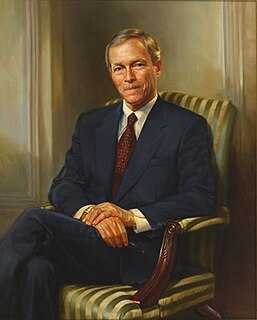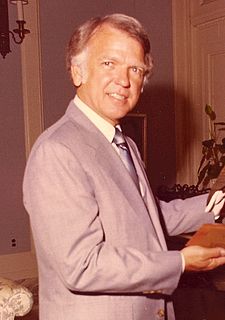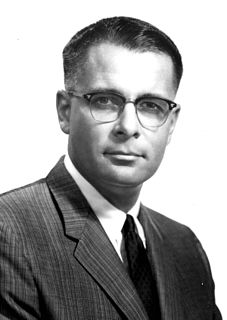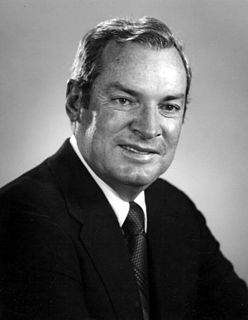
Kenneth Hood "Buddy" MacKay Jr. is an American politician and diplomat from Florida. A Democrat, he was briefly the 42nd Governor of Florida following the death of Lawton Chiles on December 12, 1998. During his long public service career he was also a state legislator, a U.S. Representative, lieutenant governor, and special envoy of President Bill Clinton's administration for the Americas. As of 2019, he is the last Democrat to serve as Governor of Florida.

Reubin O'Donovan Askew was an American politician, who served as the 37th Governor of the U.S. state of Florida from 1971 to 1979. He led on tax reform, civil rights, and financial transparency for public officials, maintaining an outstanding reputation for personal integrity.

The 1986 United States Senate elections was an election for the United States Senate in the middle of Ronald Reagan's second presidential term. The Republicans had to defend an unusually large number of freshman Senate incumbents who had been elected on President Ronald Reagan's coattails in 1980. Democrats won a net of eight seats, defeating seven freshman incumbents and regaining control of the Senate for the first time since January 1981. The party not controlling the presidency gained seats, as usually occurs in mid-term elections.

Thomas LeRoy Collins was an American attorney and politician, the 33rd Governor of Florida, serving a special term in 1955, and being elected to a four-year term in 1956, serving through 1961. He was previously elected to several terms in the Florida House of Representatives and Senate. He was the first governor of the South to promote the moral necessity of ending segregation. Counseling "progress under law", he took a moderate course during the civil rights movement and is remembered as a voice for civil rights.

Claude Roy Kirk Jr. was the 36th Governor of the U.S. state of Florida (1967–1971). He was the first Republican Governor of Florida since Reconstruction.

The 1970 United States Senate elections was an election for the United States Senate, taking place in the middle of Richard Nixon's first term as President. The Democrats lost a net of three seats, while the Republicans and the Conservative Party of New York picked up one net seat each, and former Democrat Harry F. Byrd Jr. was re-elected as an independent.

George Patterson Nigh is an American politician and civic leader from the U.S. state of Oklahoma. Nigh served as the 17th and the 22nd Governor of Oklahoma and as the 8th and 10th Lieutenant Governor of Oklahoma. He was the first Oklahoma governor to be re-elected and the first to win all 77 counties in the state. Additionally, short term vacancies in the governor's office twice resulted in Lieutenant Governor of Oklahoma Nigh assuming gubernatorial duties while serving as lieutenant governor.

United States gubernatorial elections were held on November 2, 2010 in 37 states and two territories. As in most midterm elections, the party controlling the White House lost ground. Democrats did take five governorships from the Republicans, and Republicans took 11 governorships from the Democrats. An independent won one governorship previously held by a Republican. A Republican won one governorship previously held by an independent. Republicans held a majority of governorships for the first time since before the 2006 elections. One state, Louisiana, had no election for governor, but did feature a special election for lieutenant governor.

Thomas Burton "Tom" Adams Jr. was an American politician from the U.S. state of Florida. A Democrat, he served in the Florida Senate (1956–1960), as Secretary of State of Florida (1961–1971), and as the tenth Lieutenant Governor of Florida (1971–1975).

James Hunter Williams, known as Jim Williams or J. H. Williams, was an American politician and member of the Democratic Party. Williams is best known for serving as the 11th Lieutenant Governor of Florida from 1975 to 1979.

The Florida gubernatorial election of 1970 took place on November 3, 1970, to determine the Governor and Lieutenant Governor of Florida, concurrent with the election to the United States Senate, elections to the United States House of Representatives, and various state and local elections.

The 1970 Georgia gubernatorial election was held on November 3, 1970. It was marked by the election as Governor of Georgia of the relatively little-known former state Senator Jimmy Carter after a hard battle in the Democratic primary. This election is notable because Carter, often regarded as one of the New South Governors, later ran for President in 1976 on his gubernatorial record and won.

Electoral history of Jimmy Carter, 39th President of the United States (1977–1981) and 76th Governor of Georgia (1971–1975).

The Askew Institute on Politics and Society at the University of Florida was established in 1994 with the primary goal to examine the critical issues facing the region, and to find a consensus to address these issues.

Carlos Lopez-Cantera is an American politician who served as the 19th Lieutenant Governor of Florida from 2014 to 2019. A member of the Republican Party, he was elected property appraiser of Miami-Dade County on August 14, 2012 and previously represented the 113th district in the Florida House of Representatives from November 2, 2004, where he served as the Majority Leader during the final two years of his term. On January 14, 2014, Governor Rick Scott announced Lopez-Cantera's appointment to serve out the term of Jennifer Carroll, who resigned on March 12, 2013.
Cowboy Pink Williams, born Simeon Pinckney Williams, was an Oklahoma politician who was the seventh Lieutenant Governor of Oklahoma from 1955 to 1959 and Oklahoma State Treasurer from 1963 to 1967.

United States gubernatorial elections were held on 3 November 1970, in 35 states and two territories.

The 1974 Hawaii gubernatorial election was Hawaii's fifth gubernatorial election. The election was held on November 5, 1974, and resulted in a victory for the Democratic candidate, Lt. Gov. George Ariyoshi over Republican candidate, former State Senator Randolph Crossley. Ariyoshi received more votes than Crossley in every county in the state.

A Massachusetts general election was held on November 4, 1958 in the Commonwealth of Massachusetts.























